Ekushey Boi Mela - In conversation with 4 young authors
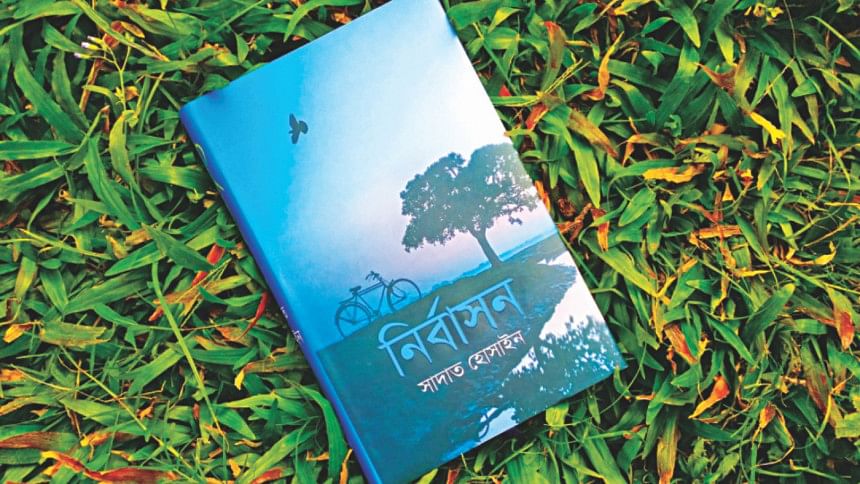
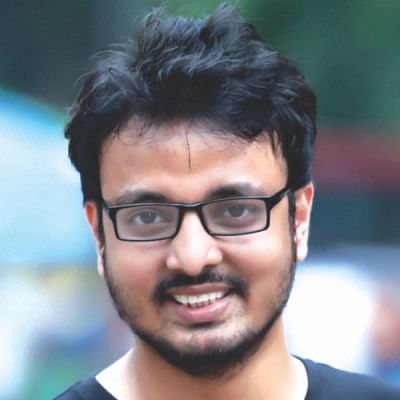
SADAT HOSSAIN
Sadat Hossain studied Anthropology at Jahangirnagar University. He has authored popular novels, namely Arshinagar, Andarmahal, Manabjanam, and Nishongo Nokkhotro, and several poetry books. His short films include Bodh, The Shoes, and Projotne. Sadat was awarded the Junior Chamber International Award, Bangladesh Shilpakala Academy's "Best Short Film Award", and SBSP-RP Foundation Literature Award.
SW: How did you enter the world of writing? What influences you to write?
Sadat: I was obsessed with reading from a young age. We lived in the village and couldn't afford books. So, I used to steal the newspapers wrapped around the saris my father bought for my mother and read them. One day, I found an issue of Kochi Kachar Ashor and found the name of a young writer called Sadat Hossain. He too, like me, was a student of Class 4. It made me both happy and sad, because I realised I would never see my name in print like that.
We couldn't afford paper in the village—we used the same piece of paper over and over again, writing first with pencil and erasing it and then using a pen, until it tore into pieces. So, on one night, I cut out alphabets from newspapers and glued them together with starch to make a collage of my name and a poem I had written. I had created my name in print. I also couldn't watch films, so I would listen to them from a distance and imagine the scenes unfolding using my imagination. That's how I started creating stories in my head.
My frustration is my inspiration, because I was discouraged to write by everyone around me—my parents, my friends, the people on my social media, everyone. I had stopped writing fiction and gotten involved with photography by the time I completed university and started working for a newspaper. A senior colleague, Mr. Azizul Rahman, encouraged me to write stories accompanying my photographs. That was my first book, titled Golpochhobi.
When I published my first novel Amar Ar Kothao Jawar Nei, my publisher told me that it had to be a small and affordable book, otherwise people wouldn't buy it because I was a new author. But I wanted to write a long novel whose characters the readers would grow attached to. Since then I have always chosen to write big books—300 pages, 500 pages—inspired by stories and anecdotes from my childhood.
SW: Can you tell us about Nirbashon, the novel you released at the Boi Mela this year? Was that also inspired by a childhood story?
Sadat: Yes, it was inspired by a story my Nani told me. The novel is set in 1987, when activist Noor Hossain was killed by the police while protesting against Ershad's rule. It explores the dacoit culture in villages at the time—the way they plundered houses and sent out letters with threats of robbery. My story starts when a man receives such a threat and how his son and then his granddaughter live with that trauma. I've also tried to explore the political climate and the media unrest of the time and tried to draw parallels to the current climate of the country. Many twists and turns in the plot follow afterwards. A few years ago, I would've had to go through countless books to educate myself on such a historical background, but now, the internet has been a priceless source of information for me.
SW: You talked about being discouraged from writing by your family and friends. Do you think the younger generation of writers in our country get enough motivation to write? How can they be better encouraged?
Sadat: Motivation is integral, I say that as someone who was criticised, discouraged, laughed at, and exploited as a writer by almost everyone around. Our literary scene is too quick to dismiss people who want to write, or are too prone to competitiveness and jealousy. There is a lack of constructive criticism. I think it is the responsibility of senior writers to notice and cultivate budding talents. Maybe someone isn't an excellent writer, but maybe he has potential to grow if guided properly. Of course, one can't always blame the senior writers because there are so many people entering the market every day.
SW: Yes, and this is where book marketing comes in. Where do you think book publicity in the country stands and how can it be improved?
Sadat: This is something I've been fighting for since the release of my first book. I started releasing abstracts of my texts on Facebook to attract readers; I shared countless book release notices by other emerging writers. I was heavily criticised for it then. I believe that Facebook is one of the most helpful platforms for book marketing today because it reaches such a wide audience.
At the same time, I've also been pushing publishers to advertise books on billboards, in addition to speaking in radio shows about upcoming releases. I understand that publishing, being such an unprofitable industry, can't afford such means of advertisement. But this is why we need more initiatives from the media, from the government, and from other organisations. We need to inform the public of the kind of literature being produced instead of just announcing annual events like the Boi Mela. We're going through a huge transition period—there is so much noise around us, so many entertainment avenues. How else will literature survive if we don't help keep it alive?
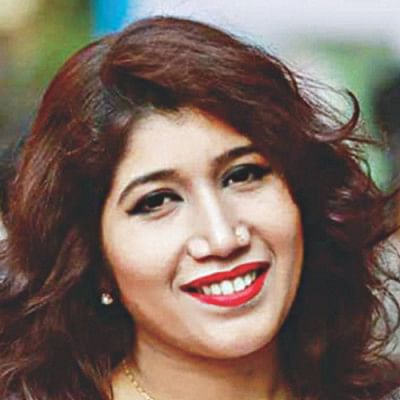
MARIA SALAM
Maria Salam studied English Literature at Rajshahi University and Journalism at the International Institute for Journalism (IIJ) of INWENT, Berlin, Germany. In addition to working as a journalist since 2006, her love for literature led her to found the online literary periodical Chharpatra. She is currently in charge of the English version of Kaler Kantho newspaper.
SW: Neelkanthi, released at the Boi Mela this time, is your first short story anthology. How did you decide to write this book?
Maria: It was all because of my parents, my brother and my colleagues at Kaler Kantho, who encouraged me to write something for myself after 12 years of writing as a journalist.
There is actually no word called 'neelkhanthi'. The word is neelkanth, which refers to the Lord Shiva. The story goes thus: when the gods churned the ocean to get elixir from the bottom, they also extracted a deadly poison that would destroy anyone who came into contact with it. Lord Shiva volunteered to drink the poison to protect everyone else; as a result, he started turning blue. But goddess Parvati, in an effort to save him, managed to contain the poison within his throat. Hence the name 'neelkanth'.
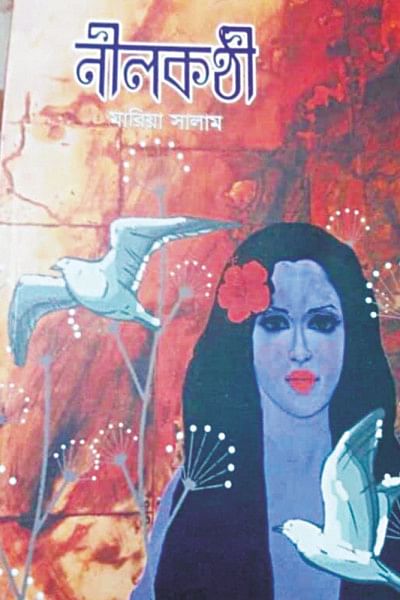
The title of my book is meant to be the female version of neelkanth, symbolic for the women in society who sacrifice so much in their daily lives. The stories in my anthology are about five such women characters who persist through hardship using their inner strength. Most of the stories were inspired by real life observations.
SW: Can you give us a sneak peak into one of the stories?
Maria: Yes. For instance, the story Onnonoroke is about Tuktuki Begum, a village woman who suffers from disease during her second pregnancy at the age of 18. Her family and society ostracise her. They take away her daughter and lock her up in a cowshed for 40 years to contain the stink of her illness. Eventually, some NGO workers find her and operate on her. They contact her daughter, now grown up, to come pick her up, but Tuktuki Begum decides to leave on her own. The story is about how she chooses to keep on living despite such a life of torture, and how she chooses an independent life after she recovers.
SW: Has being a journalist helped you to bring authenticity to your stories? What kind of research did you put in behind the book?
Maria: Yes, my journalistic instincts helped immensely. For Onnonoroke, I visited villages, spoke to NGO workers and patients suffering from the fistula disease in Satkhira and Khulna. For another story about a Rohingya child in Teknaf, I spent a day with Rohingya children there.
SW: What advice would you like to share with aspiring writers?
Maria: Two things. First, do your research. Make your story, your setting, authentic. Read widely for inspiration and for background knowledge on the topic of your story, and visit the places you set them in. But once you start writing, forget the other books you've read. Write like yourself, don't copy anyone else's style.
SW: What changes would you like to see in the book market in Bangladesh?
Maria: I think we need more writing—not just textbooks, but more fiction and creative non-fiction—on mental health and the significance of social relationships.
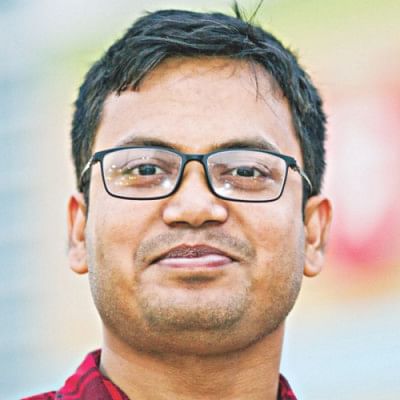
RAJIB HASAN
Growing up in Rangpur, Rajib Hasan started his writing career at a local newspaper and the Kotha magazine of the Rangpur Biswa Shahitto Kendra while also staying heavily involved in theatre. He studied Public Administration at Dhaka University, and started working as a journalist during his student days. Currently, he is a sports journalist at the daily newspaper Prothom Alo. Rajib has published four books and in 2017, won the Kali O Kolom Award for his novel Haripada O Galiyen. For the past three years, he has also been hosting the Mentos Batti Jalao show on ABC Radio.
SW: Your fourth novel, Boka Baba O Kidnapper, has been released at the Ekushey Boi Mela this month. Can you tell us a little about the book?
Rajib: Publishers always ask me for a book prior to the Boi Mela. This year, I was having trouble coming up with a topic. Then I noticed a news report about a divorce in Chittagong. The report only had one quote from the child being fought over for custody. I found it strange, because in such a situation I think the child's state of mind should be the most important. I decided to focus on that angle in my novel. The book is about a poet who is an irresponsible father and husband. The mother realises that their daughter, Joyeeta, deserves a better life and so decides to leave for Canada. The father fights to keep Joyeeta with him. Shortly before their departure, however, Joyeeta goes missing from school. And the story unfolds from there, written from the point of view of Joyeeta.
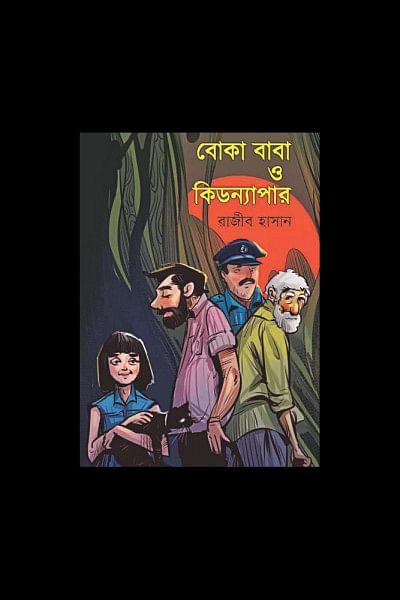
SW: What is your writing process like? Who or what influences you, and what kind of reader do you have in mind when you write fiction?
Rajib: I am heavily influenced by AnjanDutt, hence the title of my earlier novel Haripada O Galiyen, as well as Niaz Mehedi (I love his book Awlad Miyar Bhaater Hotel). However, I also read like a journalist, having been one for 16 years. I believe that I am the only reader for my story when I write, and I try to be an objective self-editor. As for inspiration, I find the root of my stories in the life I see around me and use my imagination to build on what I observe.
I always knew I wanted to write. I became involved with journalism after completing my studies, but even then I leaned more towards feature stories, which involves some storytelling. My radio career also stems from an interest in storytelling through a different medium. But journalism is a tiring job, both mentally and physically. Writing fiction allows me to shed some of that exhaustion. It gives me breathing space.
SW: You mentioned how you try to appraise your own writing objectively, as a reader. What are your thoughts on the role of editorship and, following that, book marketing, in the Bangladeshi literary scene?
Rajib: Editors have one of the most crucial roles in the making of a book. Every year, the Boi Mela features almost 3,500 writers, many of them new writers. They either self-publish or are exploited by the publishers. They forget the main question—why do I write? For whom am I writing? It is the editor's job to help the writer along the way as he writes his book, to ensure consistency and spot loopholes in the plot as an objective third party. The lack of proper editors fails to encourage and hone the talent of new writers in our country.
I also feel strongly about the lack of proofreaders. Most of the books published today have so many typographical errors. A reader will stumble and lose interest in the text if they notice 10 mistakes when they start reading. The same goes for book marketing. I think the main issue is that we hesitate to think of books as commodities. We must remember that publishing is a business, at the end of the day, and promoting its products to the reader is a must. The lack of proper royalties is very discouraging for aspiring writers in the country. Meanwhile, I think the relationship between the text/writer and the reader is similar to cricket—the way a player needs to run towards the ball from the non-striking end. A reader needs to meet the text halfway. In order for that to happen, the printing industry needs to catch up with the advances in technology and evolve from its archaic practices. Technology as we know it today gives me hope because it allows books to reach more readers; and also because, despite the arrival of radio, film, television and the internet, the written word has continued to prevail.
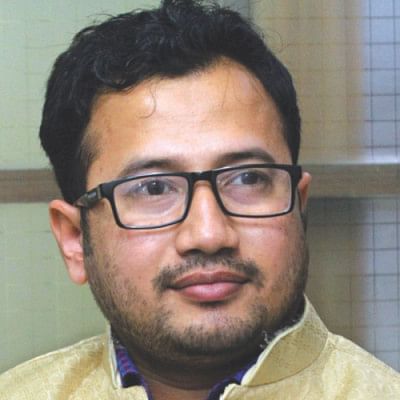
SABIDIN IBRAHIM
Sabidin Ibrahim has been writing in both English and Bengali since his student days at the English department of Dhaka University. His poetry was published in In Praise, In Memory, In Ink (2012) and A Poet's View of Being (2013), two poetry anthologies released in Canada, and in the 61st issue of Bangla Academy's Uttaridhikar (2015) literary paper. He has also translated several books, and is currently a convener at Bangladesh Study Forum (BSF) and sub editor at the Daily Bonik Barta.
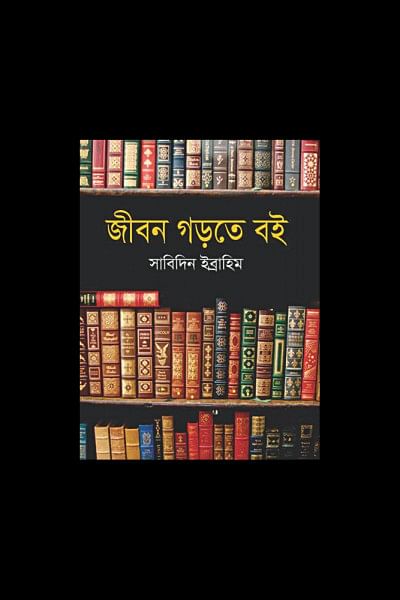
SW: Can you tell us about your latest book Jibon Gorte Boi released at the Boi Mela this time?
Sabidin: I started out on the project to answer several questions. What is reading? How can one read better and more effectively? What books should one read in order to read better? I researched on these topics for 4-5 years and lectured at several universities. My book discusses how reading can shape a person and the society. I suggest ways in which students can learn to speed read, extract the gist of a text, and better understand it.
SW: What kind of readers is your book targeted at? Is it meant to be read in academic circles only?
Sabidin: I'd say it's meant for anyone who wants to learn to read more effectively in their everyday lives, not just academic reading. 80 percent of the book can be comprehended by school-going children, but it can be read by both adults and children.
SW: What kind of response has the book received so far?
Sabidin: It was released on February 7, but it has already been adapted by several study circles, including the Pathshala reading group on Facebook.

 For all latest news, follow The Daily Star's Google News channel.
For all latest news, follow The Daily Star's Google News channel. 



Comments